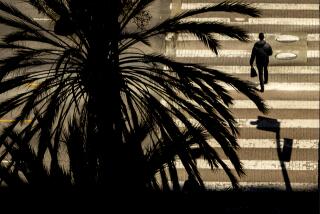Clogged Arteries
- Share via
We can’t find gridlock in our dictionary, but we can find it almost any day within a block or two of the office: (1) Temporary vehicular paralysis, lasting through one or more cycles of traffic lights, induced by drivers who venture into intersections on the yellow expecting cars ahead of them to part like the Red Sea. (2) Grande Gridlock: Involving one or more buses.
The law encourages this sort of Red Sea thinking. Failing to start into an intersection when a light turns green, even if the lanes on the other side are clogged and there is no reason to think they will move at any time in the near future, can be interpreted as illegal. But then our impression is that few drivers who get trapped in intersections are thinking about the law--or much of anything.
The law is about to change. The state Legislature has approved a bill, sponsored by Assemblyman Richard Katz (D-Sepulveda), that would allow cities to slap fines ranging from $50 to $500 on a driver who starts through an intersection on a green light but fails to make it across before the light turns red.
Since Gov. George Deukmejian is a strong law-and-order man, we assume that he will not hesitate to sign the bill into law. Then Los Angeles and other major cities plagued by gridlock can set about putting the new policy into effect.
Gridlock is not the only cause of coagulation in parts of the city with large daytime working populations, and it may not even be the most serious, but it is one of the most frustrating.
Gridlock is one of the items on Los Angeles Mayor Tom Bradley’s list of things that he wants the City Council to deal with in an effort to make traffic in congested areas flow more smoothly. Among the other things are raising the fines for parking in tow-away zones and cracking down on drivers who run red lights.
Enforcing a gridlock ordinance under state law would not be as simple as saying that it is a good idea. The city’s traffic-control officers will need authority to write gridlock tickets, and the force will have to grow so that someone can direct traffic while tickets are being written. But if it means an end to staring at the side of a bus while the light turns green and then red and then green again, we would be for it. Who knows? The time may even come when dictionaries will have to include the word gridlock for people who have never seen the real thing.
More to Read
Sign up for Essential California
The most important California stories and recommendations in your inbox every morning.
You may occasionally receive promotional content from the Los Angeles Times.












